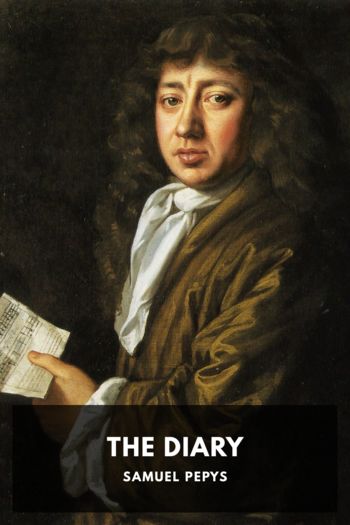The Diary, Samuel Pepys [e reader books TXT] 📗

- Author: Samuel Pepys
Book online «The Diary, Samuel Pepys [e reader books TXT] 📗». Author Samuel Pepys
In depest silence that act concealed might,
That so the creadet of our nation might be saved;
But if the powre devine hath ordered this,
His will’s the law, and our must aquiess.”
These wretched verses have obviously no merit; but they are curious as showing that Fairfax, who had refused to act as one of Charles I’s judges; continued long afterwards to entertain a proper horror for that unfortunate monarch’s fate. It has recently been pointed out to me, that the lines were not originally composed by Fairfax, being only a poor translation of the spirited lines of Statius (Sylvarum lib. v cap. ii l. 88):
“Excidat illa dies ævo, ne postera credant
Secula, nos certè taceamus; et obruta multâ
Nocte tegi propria patiamur crimina gentis.”
These verses were first applied by the President de Thou to the massacre of St. Bartholomew, 1572; and in our day, by Mr. Pitt, in his memorable speech in the House of Commons, January, 1793, after the murder of Louis XVI —B. ↩
This gentleman was a connection of Sir Edward Montagu’s, whose daughter Jemima he wanted to marry, but he was not received with favour by her (see January 17th, 1659–60). ↩
Clare Market, named after John Holies, Earl of Clare, was at first known as New Market. John Willis’s Mnemonica, or the Art of Memory, was published in 1661, by “Leonard Sowerby at the Turnstile near New Market in Lincoln’s Inn Fields.” ↩
Mrs. Jemimah, or Mrs. Jem, was Jemima, eldest daughter of Sir Edward Montagu. At this time she and her sister, Mrs. Ann, seem to have been living alone with their maids in London, and Pepys’s duty was to look after them. ↩
Pepys does not appear to have made any progress in learning the game, for on May 15th he writes that he cannot play it. “The game at cribbidge” is described in the Complete Gamester, 1677, and subsequent editions. ↩
Pepys constantly visited “Will’s” about this time; but this could not be the famous coffeehouse in Covent Garden, because he mentions visiting there for the first time, February 3rd, 1663–64. It was most probably the house of William Joyce, who kept a place of entertainment at Westminster (see Jan. 29th). ↩
Jemima, wife of Sir Edward Montagu, daughter of John Crew of Stene, afterwards Lord Crew. ↩
Jane, daughter of John Pepys of South Creake, Norfolk, married to John Turner, Sergeant-at-law, Recorder of York; their only child, Theophila, frequently mentioned as The. or Theoph., became the wife of Sir Arthur Harris, Bart., of Stowford, Devon, and died 1686, s.p. ↩
Mr. Vanley appears to have been Pepys’s landlord; he is mentioned again in the Diary on September 20th, 1660. ↩
Pepys visited several Swan taverns, so that it is impossible to say which one is here referred to. It might have been either the one in the Palace Yard or the one in King Street, Westminster. ↩
It was not usual at this time to sit down to breakfast, but instead a morning draught was taken at a tavern. ↩
The rising of the Fifth Monarchy men is described later on. ↩
Hinchinbroke was Sir Edward Montagu’s seat, from which he afterwards took his second title. Hinchinbroke House, so often mentioned in the Diary, stood about half a mile to the westward of the town of Huntingdon. It was erected late in the reign of Elizabeth, by Sir Henry Cromwell, on the site of a Benedictine nunnery, granted at the Dissolution, with all its appurtenances, to his father, Richard Williams, who had assumed the name of Cromwell, and whose grandson, Sir Oliver, was the uncle and godfather of the Protector. The knight, who was renowned for, his hospitality, had the honour of entertaining King James at Hinchinbroke, but, getting into pecuniary difficulties, was obliged to sell his estates, which were conveyed, July 28th, 1627, to Sir Sidney Montagu of Barnwell, father of the first Earl of Sandwich, in whose descendant they are still vested. On the morning of the 22nd January, 1830, during the minority of the seventh Earl, Hinchinbroke was almost entirely destroyed by fire, but the pictures and furniture were mostly saved, and the house has been rebuilt in the Elizabethan style, and the interior greatly improved, under the direction of Edward Blore, Esq., R.A. —B. ↩
Dick Spicer, afterwards a brother clerk with Pepys of the Privy Seal. ↩
Dick Vines. ↩
George Vines. ↩
It was usual to have a “chest of viols,” which consisted of six, viz., two trebles, two tenors, and two basses (see note in North’s Memoirs of Music, ed. Rimbault, p. 70). The bass viol was also called the viola da gamba, because it was held between the legs. ↩
Later on (January 9th) it is said that Bradshaw’s lodgings were being prepared for Monk. ↩
Edward Montagu, son of Sir Edward, and afterwards Lord Hinchinbroke. ↩
Thomas Pepys, probably the son of Thomas Pepys of London (born, 1595), brother of Samuel’s father, John Pepys. ↩
John Pepys was born in 1641, and his brother Samuel took great interest in his welfare, but he did not do any great credit to his elder. He took orders in 1666, and in 1670 was, through the influence of his brother Samuel, appointed Clerk to the Trinity House. In 1674 he was appointed joint Clerk of the Acts with Thomas Hayter. He died in March, 1676–77, leaving some debts which Samuel paid. ↩
Elizabeth, daughter of Richard Pepys, Lord Chief Justice of Ireland, and wife of Thomas Stradwick.





Comments (0)